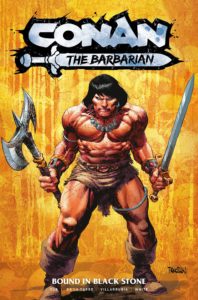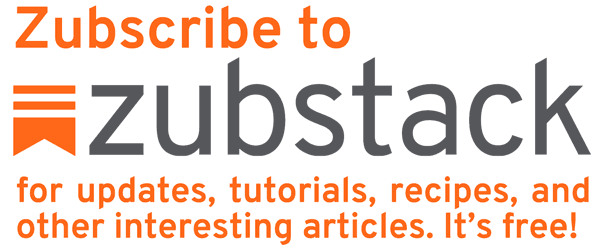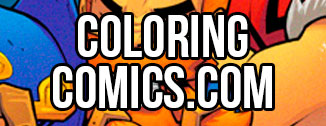“Networking” is one of those broad social terms that get tossed out in conversation, and everyone who’s been around a while nods their head knowingly when the word comes up, but it’s something I think is quite misunderstood by a lot of people trying to get their start in comics or any other creative business.
Networking is not entering a social setting, finding the most “powerful” person there and trying to dazzle them so you can become “friends”.
It’s not sending lists of questions to professionals so they can “help” you break in.
It’s not tagging people on Facebook so they see your artwork or writing.
It’s not about dominating a conversation or hogging the spotlight.
It’s not nepotism or elitism, contrary to what some may think.
At its root, “networking” is about expanding your social circle in your related field. It’s casual conversation, shared enthusiasm, good manners, kindness, and common sense, whether those interactions are online or in person. Through the bonds of friendship and trust that build over time you’ll broaden your perspective on the creative and business sides of the industry and, eventually, find out about opportunities before people who are not as involved in those areas.
Like any kind of socializing, networking can be difficult to navigate at times. Everyone is doing their own thing and has their own wants and needs, both in the immediate and the future. There’s no perfect path for networking, but I can give you some quick tips gained from years on the convention circuit and working with publishing, video game, movie, and other entertainment companies.
• Friendly, casual: Networking isn’t contract negotiation and it’s not a job interview. Over the long, long haul it may lead to that kind of stuff later on, but don’t over formalize something that’s not all business.
• Be yourself at your best: Don’t try to put on airs or be something you’re not, but also try to be the best version of “you” that you can.
• Don’t come on too strong: I know it can feel like the current social interaction you’re having is the only time you’ll ever get the chance to sell yourself or make the big pitch, but fight that nervous urge and try to relax.
• Everyone is worth meeting: A lot of people want to meet celebrities, editors, art directors, and other decision-makers, but some of the most enjoyable and valuable networking I’ve done is with people who weren’t instantly recognizable as a “big deal”. Introduce yourself to someone you don’t know and you may be surprised at who they are and what they do.
• Listen and Ask: Engage the people you meet instead of just talking about yourself. Listen to where they steer the conversation and go with the flow. It’s not all about you.
• There is no perfect conversation: Don’t rehearse what you’re going to say and don’t expect to check off a list of “key points”. Try to enjoy the interaction for what it is instead of trying to make it something it’s not.
In my experience, the best kind of networking is the stuff that feels almost effortless – enjoyable conversations about shared interests, enthusiasm for the work of others, catch-all chatter about people and places. It’s a relaxed baseline of socializing that lets people know you’re decent and worth getting to know more about. I know that doesn’t sound like it’s going to get you a job but, believe me, it’s an important first step into a larger community where those kinds of first impressions mean a lot.
People tell me that they don’t know “how” to network, but they’re usually over thinking things. Do you like meeting people who like the same kinds of things you like? Do you like talking about those shared interests? Are you in for the long haul? In my experience that’s 90% of what networking actually is.
Everyone wants to work with reliable people. Getting to know you, or hearing from other trusted people that you’re one of the “good ones”, can open up doors. It’s frustrating when that “in or out” mentality pushes away good people or doesn’t embrace a proper range of diversity, but that’s not exclusive to comics by any means. It’s something a lot of creative businesses are grappling with as views broaden and the market for stories becomes even more global.
People in these businesses talk. They weigh opinions. They gossip. I can’t tell you the number of times a name will come up in conversation and I hear the exact same feedback coming out over and over from completely different people. Word gets around, both positive or negative. Good networking (and, you know, being a decent upstanding person in general) is a valuable way of making the right kind of impression and building a solid reputation. It doesn’t get you a job all on its own, but coupled with a quality body of work and a bit of luck it does help bridge the divide from aspiring amateur to paid professional.
Let me give you a personal example – Back in 2002 John Barber and I were both amateur webcomic artists putting our work online. John’s comic was a superhero deconstruction tale called Vicious Souvenirs and mine was a surreal coming of age comic called Makeshift Miracle. The two of us met socially through the late Joey Manley as part of a webcomic collective called Modern Tales. While promoting my webcomic at that time I met all kinds of different creators and attended conventions across North America, slowly building up my skills and body of work.
Now, in 2014, John’s a Senior Editor at IDW and we’re talking about a new project I’ll be writing that’s set to launch in the Fall (Update: That comic is Dungeons & Dragons: Legends of Baldur’s Gate!). In the 12 years inbetween these two select points John and I have seen each other dozens of times. We’ve chatted, laughed, and built up mutual respect for each other. There’s a professional but casual friendship that’s grown over time and it gives John confidence that I’m a capable creator who will deliver the goods. I didn’t meet him back in 2002 expecting one day he’d hire me to write a comic, things progressed naturally out of shared social contact as part of this community. John is just one of literally hundreds of people I’ve met in the business over the past 12 years. When I look back through my career I can see weird and wonderful connections between the people I met over a decade ago and the work I’m doing in the here and now. That’s how it works.
Networking is easier than you think – Be social, be decent, and be involved. Don’t try to over think the destination, just focus on the journey itself and enjoy meeting people along the way. You’ll make lifelong friends, broaden your horizons and then, when you least expect it, professional opportunities may come your way.
If you find my tutorial blog posts helpful, feel free to let me know here (or on Twitter), share them with your friends and consider buying some of my comics to show your support.





 Zub on Amazon
Zub on Amazon Zub on Instagram
Zub on Instagram Zub on Twitter
Zub on Twitter
I never really comment on sites outside of Reddit but I got to thank you for these posts. The whole breaking into comics question has got to be exhausting to answer. So it’s awesome to have a creator share their journey and expertise so openly as well as effectively as you do. Your website has been like a textbook (a fun one, vandalized with pictures of dwarves and samurais) for me these past few months and hope you continue to tackle these kind of subjects.
I don’t know if there are any books out there that talk about breaking into comics, especially in the current market of Kickstarter and digital distribution but there might be a audience out there. Man, I would buy a book with just a bunch of creators talking about the random ways they got started and their early struggles. I mean a book on Kickstarter about coloring comics just made $32,000, so I would think a book beneficial to both writers and artists could be even more successful. Alright… i’m kind of just rambling on now. Thanks again.
I agree with j.song, especially if it’s done in a similar manner to Mr. McCloud’s “Understanding Comics.” You could have all the creators as characters interacting with one another (like a poker night kind of setting) going down memory lane. Again, these posts have been an enjoyable read!
I appreciate how decency is the main tip in networking, Jim. As a woman, I know what a pick-up scene conventions are. Hey, we’re there to let loose, unwind and have some fun. What’s not okay is when a man teases that he wants to help a woman with her comics career like reviewing scripts/art or “maybe” introduce her to someone like an editor but then ask her up to a hotel room. That crap is rampant. It would be a breath of fresh air to have a man offer to read a script without following it up with a one-night stand as a downpayment for the opportunity. There are decent human beings at conventions but as a woman, you might not be able to find them as easily.
Any idea where I can still read Vicious Souvenirs? I started reading it a long time ago and now that Modern Tales is shut down I can’t finish it. If you could help me out that would be great.
I’m not sure actually. You’d have to check with John about that.
Awesome advice all around! Definitely need to apply this. Sometimes, I treat my free non-comic-writing nights on various social media, treating it like a huge house party. I say a few hello’s, chime in on certain conversations here and there, etc.
That has always helped me.
P.S. Samurai Jack is amazing! Brings back childhood memories!
That’s a great story about John Barber– he’s the one who got me my first gig when he was an editor at Marvel!
And you’re absolutely right, there are so many people I’ve met at conventions who started off as dedicated amateurs, and have since found places in the industry, so you never know who you’re meeting and where they’ll go. Be nice to everyone!
Thanks to Charles Lippincott sharing your post, I’ve found that here and think you’re right. I’m fan editing STAR WARS, but that may not so different to comics. So I perhaps can give you a comic-like fan edit clip of a scene which could generate fun to you, ebjoy
https://vimeo.com/58321625